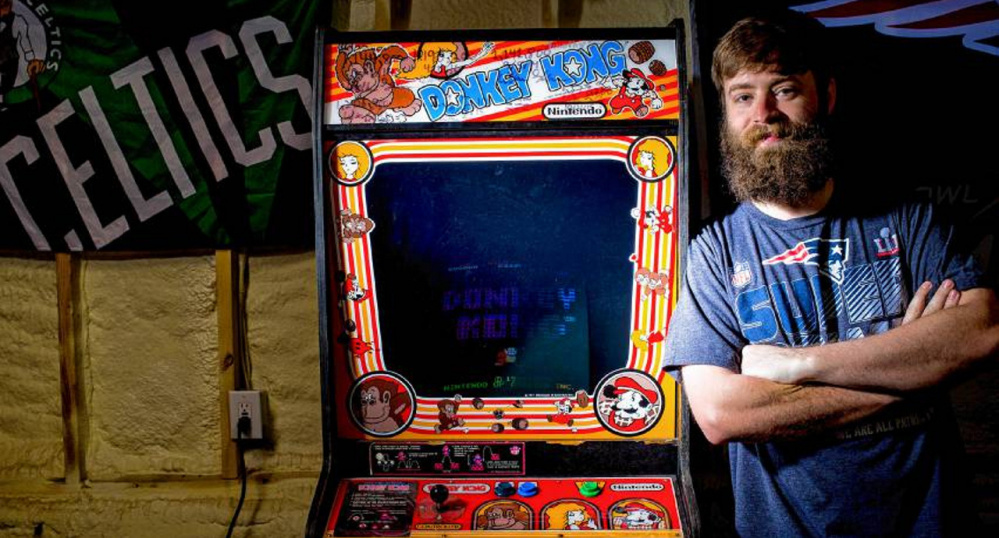CONCORD, N.H. — Robby Lakeman’s claim to fame can be traced back to a storied New Hampshire institution.
“By luck my grandparents lived near Funspot [in Laconia] and they used to take me there when I was a kid,” said Lakeman, a 2005 graduate of Concord High School, looking back on how his skill playing the arcade game “Donkey Kong” put him in the Guinness Book of World Records and made him star of a documentary film hosted by RedBull TV.
“I grew up playing home video games – Super Nintendo, Nintendo 64 – and by 2011, my friends were going to Funspot trying to break a record every weekend. I started going too, going around playing arcade games, seeing which one I like. I ended up starting to break some records myself,” he said.
Arcade games, the computer-controlled cousins of pinball machines, have sucked quarters out of people’s pockets for decades, starting with “Asteroids” in 1979 and “Pac-Man” in 1980. Although their heyday is past, with the gaming mantle now owned by internet-connected online gaming and home consoles, they retain a broad appeal.
And it’s not just due to nostalgia said Lakeman, who at age 30 is five years younger than “Donkey Kong” itself.
“I like the older, classic games. They’re like a test – you have to work on memorization of patterns, spotting trends,” he said. “They’re programmed to steal your money, so you’re trying to figure out how to outsmart a computer, which is fun.
“The newer games, 90 percent of the time you’re playing against other humans,” he said.
Lakeman says he gravitated to “Donkey Kong” at Funspot for a variety of reasons. Partly it’s the game itself, which includes random elements to keep you on your toes and builds to a conclusion, unlike many video games that are theoretically endless.
There’s also a historical element. The barrel-throwing gorilla villain has become a popular culture icon, as has Pauline, often called the princess, who must be rescued – while the mustachioed hero, known only as “Jump-Man” in the original “Donkey Kong” but later named Mario, is such a global phenomenon that Japanese Prime Minister Shinzo Abe dressed up as him when attending the 2016 Olympics ceremonies in Rio.
“That’s part of the appeal: This is the original source for all those characters,” said Lakeman.
A 2007 documentary “King of Kong: A Fistful of Quarters,” about two men battling to break the “Donkey Kong” record, raised the profile of classic gaming, as did movies like 2012’s “Wreck-It Ralph,” about a video game character, and even the 2015 flop “Pixels” featuring New Hampshire native Adam Sandler. More recently an amalgam of speakeasy and arcade has cropped up.
Lakeman drew attention in the arcade community in 2014, when he broke the all-time “Donkey Kong” record high score, and even more attention in 2015 when he and Wes Copeland took the record back and forth from each other twice in the course of six hours.
Fast forward to 2016 and “Arcade Renaissance,” a 24-minute film about the Kong Off, the annual “Donkey Kong” competition, which features Lakeman and Copeland in classic documentary style, including super slow motion walks and discussing strategy with a deadpan stare at the camera. The documentary is on RedBull TV and may make it to Hulu, said Lakeman.
Lakeman, who graduated from Methodist University in North Carolina with a business administration degree, is back in Concord after living in Arizona and yes, he owns his own Donkey Kong arcade console to practice on.
“This is going to sound funny but I partially malnourish myself” when entering a competition, Lakeman said.
“You don’t want to drink too much water, don’t want to eat too much. A world record game is 31/2 hours, and that’s a long time to go without going to the bathroom.”
This unusual skill has proved to be a high-level hobby rather than an actual occupation, since there’s no big money in it: For example, Lakeman got just $1,500 for winning the world championship.
“You basically have your trips paid for, to tournaments – that’s what we play for,” he said.
As for being world champ, Lakeman said “I get a lot of mixed reactions” although “90 percent of the time” it’s positive, particularly when that book of world records is brought up.
“When you mention it to somebody that you’ve been in Guinness, they think it’s cool – it could be for cherry-pit spitting, but it’s still cool!” he added.
Copy the Story LinkSend questions/comments to the editors.



Success. Please wait for the page to reload. If the page does not reload within 5 seconds, please refresh the page.
Enter your email and password to access comments.
Hi, to comment on stories you must . This profile is in addition to your subscription and website login.
Already have a commenting profile? .
Invalid username/password.
Please check your email to confirm and complete your registration.
Only subscribers are eligible to post comments. Please subscribe or login first for digital access. Here’s why.
Use the form below to reset your password. When you've submitted your account email, we will send an email with a reset code.